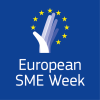Company: Longenesis
Country: Latvia
Longenesis is a medical technology startup company working towards providing a technological bridge between Healthcare institutions and the BioTech industry with an aim to help identify and unlock the hidden value of biomedical data to accelerate the novel drug and treatment discovery and provide better help to those in need.
For more information: https://longenesis.com/

Profile: Emil Syundyukov
Emil is Latvian and is a Ph.D. student in Computer Science and Digital Health. His heroes are his mother, for her unconditional love and her ability to stay strong throughout the hard times they went through when he was a child. One of his mentors is his former scientific advisor Prof. Leo Selavo, who helped him take his first steps in digital health and showed him that computer science was a brilliant toolkit for problem solving in domains like healthcare. Emil has always had an entrepreneurial spirit; he has always wanted to create – it is hard for him to just sit still.
Interview
Tell us about your business
Longenesis is the largest digital health start-up in Latvia. We provide tools to accelerate clinical research and data-driven decision-making in healthcare without borders. Our award-winning solutions already empower more than 380 000 patients and study participants in more than 10 disease domains and 14 countries.
Where did you get the idea from?
All of the co-founders had prior experience in healthcare. I was always interested in bringing more value out of health data. While doing research projects related to data collection and analysis, I have encountered the challenges of accessing and combining data from various sources, including patient-reported data, as well as the lack of proactive engagement. We combined our experience and joined forces to solve those challenges.
How old were you when you first decided you would start your own business?
I was 23 years old. Being an undergraduate student and working in the IT industry, I was always thinking about how to utilise the power of digital technologies in healthcare. One of the first projects came out of my thesis. While working on my thesis I had knee surgery. Staying at home and needing to monitor a variety of parameters to have better rehab results, I designed a wearable sensor system for real-time monitoring and rehabilitation assistance after knee surgery.
How did you get it off the ground?
I do not think that there is any golden formula for this. For us, it was a combination of factors: the right people, including the team members I am lucky to build our company with, as well as advisors, partners, and clients; the right timing, as well as thousands and thousands of work hours spent not only on building the product, but also getting your head bumped, pivoting, and navigating through an ocean of uncertainty.
Who did you turn to for help?
Our first clients were our biggest help and support - we have partnered with key opinion leaders in the field, including hospitals (e.g. Children’s Clinical University Hospital in Latvia), patient advocacy groups, and industrial players, that helped us polish our idea and build a product that is needed. I would like to say a special thanks to our advisors, who help us along the way in developing the company and products.
Describe some of the obstacles you faced as a young person starting out in this business.
Healthcare, being in need of innovations, is one of the most conservative industries out there. It brings certain obstacles, including the long sales cycle. The first steps were the hardest ones – needing to prove the value brought by our technology, our team knocked on a lot of closed doors. Also being a 26-years-old entrepreneur aiming to bring new approaches to healthcare.
How do you define success?
Success cannot only be measured in revenue growth metrics. For me, success is seeing the value brought to healthcare practitioners, as well as to patients, who receive value based on health data.
What was the most challenging aspect of setting up your business?
Starting something from scratch in healthcare means jumping into a stormy ocean - starting from the lack of financing for early-stage health tech start-ups, ending with finding the first customers to help you validate your concept and open doors, being key opinion leaders in the field.
What has been the most rewarding part of your journey so far?
Seeing that the fruits of a small team from Latvia are being used in 14 countries already. Hearing that Longenesis is getting more and more traction in the industry. Also, recently my friends shared a screenshot of our solution that they were using after hospital visits, which makes my heart glow.
What are the future goals of your business, and how will you go about achieving them?
Our mission is to be at the forefront of enabling secondary health data use within the EU and beyond. Taking a leading position in the CEE region + scaling across therapeutic areas, supporting multiple pharma partners, and sustaining stable growth with healthcare institutional networks. Moreover, having said that, becoming a leading solution for clinical research in CEE and MENA.
What advice would you give to other aspiring entrepreneurs out there?
Always look ‘across the fence’ of your skillset. Don’t be only tech-driven, rather use it as a tool for efficient problem-solving. Join us to drive tech in healthcare! 😀
- Συνδεθείτε για να αναρτήσετε σχόλια

